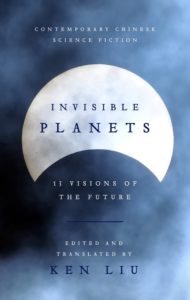With his smashingly successful translation of Liu Cixin’s The Three–Body Problem, Ken Liu introduced modern Chinese science fiction to a large English-speaking audience. The reception of the rest of Three-Body‘s trilogy, one translated by Joel Martinsen and the other by Ken Liu, showed that it was not a one-book phenomenon, and that English-speaking science fiction readers were ready, eager, for more of the genre from China.
Invisible Planets provides 13 short stories and three essays, plus an introduction and short notes about each author by Liu, that offer a wide-ranging sampling of science fiction from China published in Chinese between 2005 and 2014. The stories are from seven different authors, three of whom also contribute the essays.
In his introduction and his editorial choices, Liu emphasizes the diversity of science fiction from China, reflecting the vast scale and wide variety found in its country of origin. “Even within the limited selection of this anthology, you’ll encounter the ‘science fiction realism’ of Chen Qiufan, the ‘porridge SF’ of Xia Jia, the overt, wry political metaphors of Ma Boyong, the surreal imagery and metaphor-driven logic of Tang Fei, the dense, rich language-pictures painted by Cheng Jingbo, the fabulism and sociological speculation of Hao Jingfang, and the grand, hard-science-fictional imagination of Liu Cixin. … Faced with such variety, I think it is far more useful and interesting to study the authors as individuals and to treat their works on their own terms rather than to try to impose a preconceived set of expectations on them because they happen to be Chinese.” (p. 14)
Reading through the stories, one aspect that stuck out beyond the individuality was something of a divide among the authors whose primary activity was writing — or academic analysis of literature — and those with day jobs who wrote fiction for other reasons. The former felt, for lack of a better word, more literary, whether that is the careful structuring of the sub-parts of Xia Jia’s three tales, or what editor Liu calls, “The ease with which Ma [Boyong] marshals his encyclopedic knowledge of Chinese history and traditions [that] also makes it a challenge to translate his most interesting works.” (p. 151)
If one of the particular pleasures of fantasy and science fiction is seeing the world made strange, then stories that come from another culture and language can accomplish that doubly: not only do they go somewhere weird, they’ve started from an unfamiliar place, making the whole journey an odyssey in the new. This is maybe least true about the two Liu Cixin stories — “The Circle” and “Taking Care of God” — that close the collection. These felt more like 1950s or early 1960s stories from Western science fiction in which the author has a Neat Idea and works through it with characters who are in service to that idea. (It may just mean that Liu, who is not related to Ken Liu, is not for me, given that I also bounced off both the first and third books in the Three-Body trilogy.) By contrast, “Folding Beijing” by Hao Jingfang is a story of getting by and trying to get ahead in a dystopian setting that’s as familiar in its outlines as it is arresting in its details. There’s unexpected solidarity, and the cracks that any totalizing system wants to deny, whether that’s a one-party state, an old imperial regime, or turbocapitalism. On the other other hand, Hao is also the author of the collection’s title story, and it’s a direct homage to Italo Calvino at shorter length. It annoyed me a bit as listicle stories often do, but I liked the meta levels involved. Not surprisingly, in his introduction to her two stories, Liu writes, “Imaginative and precise, her stories are carefully designed on multiple levels.” (p. 197)
Xia Jia’s three stories take successions of short incidents and build them into fantastic constructions, sometimes of far futures, times when humans have passed from the scene and the beings that follow — some seemingly natural, others constructed long ago — try to make sense of both their world and what preceded them. At other times, such as “Tongtong’s Summer” she tells of a family’s encounter with a new and experimental technology, and how it changes them in ways both expected and surprising. The story is perfectly Chinese, and also illustrates two of William Gibson’s science-fiction aphorisms, “The future is already here, it’s just unevenly distributed” and “The street finds its own uses for technology.” In “Tongtong’s Summer,” Xia shows the beginning of an uneven distribution.
Chen Qiufan’s stories in this volume — “The Year of the Rat,” “The Fish of Lijiang,” and “The Flower of Shazui” — involve science fictional plants and animals, but are otherwise vastly different. One looks at science fiction soldiering through the eyes of uneasy conscripts, with echoes of Catch-22 and skepticism about the state. Another looks at the vast gap between rich and poor, and what that means for love, especially paid love.
Last year, Liu edited Broken Stars another volume of even newer science fiction from China. I hope it’s as good as Invisible Planets, and that further translated stories will find their way into English-language science fiction and fantasy, maybe even full volumes from several of the authors in Invisible Planets. It’s a big world out there, and translation opens up more of it, showing new perspectives that I would otherwise never have a chance to experience. More, please.

